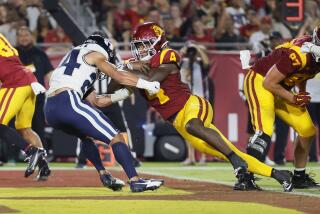Closer Inspection Reveals Reality Bytes for Trojans
- Share via
We know top-ranked USC lost a shot at playing in the Jan. 4 Sugar Bowl because it finished 0.16 behind Louisiana State in Sunday’s final bowl championship series standings.
Close, right?
Actually, it was closer than anyone could have imagined.
So close it took an astronomer to explain it.
A review of final BCS calculations reveals that had the order been flipped in only one of the four BCS computers that had LSU ranked No. 2 ahead of No. 3 USC, the Trojans would have advanced to the Sugar Bowl and LSU fans would have been crying foul.
And get this: Had that one computer placed USC ahead of LSU, the Trojans would have nipped the Tigers by the margin of 0.01.
And you wonder why the controversy rages?
Let’s go to the BCS scorecards....
Oklahoma, despite its lopsided loss to Kansas State, held its No. 1 spot in the BCS with a 5.11 total.
LSU finished second at 5.99, and USC was third at 6.15.
The schools with the two lowest scores in the final BCS standings advance to the BCS title game, which left USC out despite finishing No. 1 in both human polls.
USC and LSU basically finished in a dead heat in a race that was decided by decimal points.
The Trojans led the Tigers in four of the seven computers last week, but LSU’s weekend win over No. 5 Georgia allowed for an almost complete turnaround.
Still, had USC earned a No. 2 rating instead of No. 3 in either the Seattle Times, Wes Colley, Peter Wolfe or Richard Billingsley systems, the Trojans’ BCS computer average would have dropped from 2.67 to 2.50, giving them at least the 0.17 they needed to pass LSU and finish at 5.98.
How close did USC come to overtaking LSU in any of those computers?
The margin in the Colley Matrix borders on mind-boggling.
Here is his order of finish:
1. Oklahoma, 0.91723
2. LSU, 0.88160
3. USC, 0.87636
“It was razor thin, any way you look at it,” Colley said Monday.
Colley has a doctorate in astrophysical sciences from Princeton University and is a lecturer in astronomy at the University of Virginia.
For what it’s worth, Wes’ brother, Will, played football in the Southeastern Conference ... for Georgia.
Colley rates his teams on a scale from zero to 1. He said the difference between LSU and USC came down to a factor of five-thousandths.
Asked to put this in astronomical terms, Colley said, “If the Earth was LSU and the sun was zero, USC would be twice the distance to the moon.”
Yes, that close.
Colley said any number of results would have pushed USC ahead of LSU in his final analysis.
What if Notre Dame had defeated Syracuse?
“Let’s see if that was enough to do it,” Colley said over the phone as he substituted a Notre Dame win into his computer. “Yeah, that’s enough to do it.”
Colley said the chances of making a miscalculation are remote as long as he feeds the correct scores into his formula.
Colley said he downloads his scores from Yahoo and double-checks them against scores posted on espn.com.
There is always the chance for human error, he said, adding, “You’ve got to be vigilant.”
The Colley Matrix was the closest finish in this LSU-USC computer war, but not the only close one.
The other tallies from computers that factored into the ultimate BCS outcome:
* Peter Wolfe -- 1. Oklahoma, 7.175; 2. LSU, 7.032; 3. USC, 6.789.
* Seattle Times -- 1. Oklahoma, 0.781; 2. LSU, 0.776; 3. USC, 0.760.
* Richard Billingsley -- 1. Oklahoma, 309.799; 2. LSU, 300.683; 3. USC, 300.567.
Wolfe, an associate professor at the UCLA School of Medicine and a confessed Bruin fan, could have sent USC to the Sugar Bowl had the Trojans remained No. 2 in his rankings.
But that’s not how it came out in the end. Wolfe said LSU’s victory against Georgia was enough for the Tigers to pass the Trojans in his final rankings. Not surprisingly, Wolfe said Monday that USC fans were not pleased with his final, title game-altering flip-flop.
“There are two kinds of people,” Wolfe said in describing the reaction he has received. “There are the people who really want to understand why I had what I had.... And there are drunk people.”
Wolfe said he received an earful at lunch Monday from several of his colleagues with USC degrees.
“What can I say?” he said. “I feel bad so many people are upset.... But I think my results are a fair description of what these teams are like. I understand there are people that don’t like that.”
Wolfe said some of the e-mail he has received has been vile, but added he does not fear for his safety.
As for those who might question why the public should trust that Wolfe’s computer ranking system produced the correct results, he said, “That’s a valid concern.”
Wolfe double-checks his scores with other computer operators and has said he would allow any credible, independent person to review his numbers.
Wolfe is one of the nation’s leading researchers of infectious diseases, an accomplished pianist and a pilot. He recently returned from a trip to Las Vegas, where he became fascinated watching people as they cheered on their betting interests at a casino sports book.
It got Wolfe thinking just how passionate people can become in matters of sport. Still, there may have been moments in recent days when Wolfe wondered why he ever involved himself in the BCS.
“There are more important things in life than this,” he said.
More to Read
Go beyond the scoreboard
Get the latest on L.A.'s teams in the daily Sports Report newsletter.
You may occasionally receive promotional content from the Los Angeles Times.







